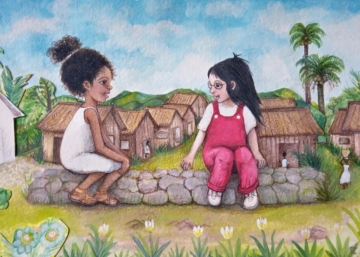A “long talk” about anti-racism, neurodiversity workshops, a symposium on Afro/Indigenous perspectives and training on LGBTQIA+-affirming counseling: These were the diversity-related projects at William & Mary made possible recently through IDEA grants.
The grants, whose name stands for “Innovative Diversity Efforts Awards,” are administered by the Office of Diversity & Inclusion each year to fund projects that will advance the university’s diversity, equity and inclusion goals.
This year, the Office of Diversity & Inclusion Advisory Committee selected four projects to receive the grants.
“During the application review process, the group focused on the range of the grant’s impact as well as its sustainability,” said Thomas Alexander, deputy chief diversity officer. “In other words, the grant proposals that had an impact on a broad constituency of the campus community and ones that could be sustained over a number of years were the target. In the end, the winners selected embodied most, if not all, of the traits the committee was looking for.”
The four selected projects include:
A Long Talk
Submitted by Peel Hawthorne, Senior Associate Athletics Director
This program includes multiple sessions – both in-person and virtual – focused on energizing participants to “erase racism and dismantle systemic oppression in America.” Participants also learn how to have “uncomfortable conversations” through which they can increase their understanding of anti-racism.
In early January, approximately 70 W&M coaches, athletic trainers and administrators participated in the “A Long Talk about an Uncomfortable Truth” program. Later in the month, the program’s facilitators hosted an in-person session for student-athletes. All participants were provided pre-work prior to the presentations and have continuing access to both static and interactive virtual programming.
“The program is transformative. It’s the most thought-provoking, empowering and strategic approach that we have experienced regarding inclusion and anti-racism,” said Hawthorne. “Our engagement with ‘A Long Talk’ underscores our commitment to our core value of belonging and was initiated in response to student-athletes’ requests to provide diversity education for coaches.”
In addition to the IDEA grant, major funding for the program was provided by Dr. Virginia Wells, chief medical officer for W&M Athletics and a 2022 Plumeri Award recipient.
Advancing Neurodiversity at William & Mary
Submitted by Joshua Burk along with co-principal investigators Cheryl Dickter and Janice Zeman, all Professors of Psychological Sciences
With support from the IDEA grant, W&M’s Neurodiversity Initiative is hosting two workshops this semester – one for students and another for 25 faculty – about neurodiversity, which acknowledges and appreciates brain differences including autism and ADHD. The faculty workshop took place on Feb. 15, and the student workshop will take place in March. The initiative is also in the process of updating its website, which includes free online resources for faculty and students.
The purpose of the faculty workshop was to promote awareness of neurodiversity on campus and to provide faculty with resources that they could consider when creating an inclusive classroom that is responsive to the needs of neurodivergent students. The purpose of the student workshop is to provide a venue for neurodivergent students to discuss their experiences and challenges.
“We are grateful for the IDEA grant as it allows us to further our neurodiversity work on campus by updating the available resources on our website and giving us the opportunity to further promote the availability of these resources to faculty and students,” said Burk.
Afro/Indigenous Perspectives, Race and Racism: Towards a new view of Latin American Studies
Submitted by Monika Gosin, Associate Professor of Sociology and Director of Latin American Studies
The W&M Latin American Studies Program is partnering with the Africana Studies Program and Omohundro Institute for Early American History and Culture to present a symposium on Afro/Indigenous perspectives, race and racism on April 13-14.

The two-day event, which will include sessions at various locations on the W&M campus, seeks to bring together “scholars and artists of Afro and Indigenous Latin American and Caribbean studies to engage with new perspectives on race and racism in Latin America, past and present,” according to the event website.
The topics of the sessions will cover African descendants and people indigenous to the Americas (both together and separately) and the relationships between those groups. Paul Joseph López Oro, associate professor of sociology at Hunter College, will give a keynote presentation on April 13, “Hemispheric Entanglements of Indigenous Blackness and AfroLatinidad,” at 6 p.m. in Tucker Hall, room 127A. The keynote for the next day will be at 4 p.m. in Washington Hall, room 201. It will be presented by Tatiana Flores, professor in the departments of Latino and Caribbean studies and art history at Rutgers University and director of Rutgers’ Center for Women in the Arts and Humanities.
For additional information and to register, visit the event’s website.
LGBTQ+ Affirming Counseling: Developing Training Protocols for Mental Health Professionals through Action Research
Submitted by Amber Pope, Assistant Professor of Counselor Education
To address counselor trainees’ self-efficacy in working with LGBTQ+ clients and communities, Pope joined with two other W&M counseling faculty and two doctoral students to create a five-week asynchronous online training program in LGBTQ+-affirmative counseling. The program is hosted through Thinkific, an online learning platform that Pope purchased a subscription to through the IDEA grant.
The training is being offered through the W&M counseling program in the School of Education to master’s-level internship and multicultural counseling classes (online and in-person) throughout the spring semester.
“We are conducting a program evaluation of the training, and expect between 60-100 participants during the spring semester, enough to do a preliminary data analysis of the training’s effectiveness at the end of the term,” said Pope.
The research team also will run focus groups with selected students near the end of the semester to explore their experiences of participating in the training.
Erin Jay, Senior Associate Director of University News

